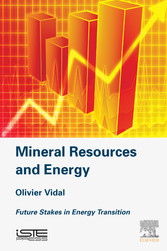Suche
Lesesoftware
Specials
Info / Kontakt
Mineral Resources and Energy - Future Stakes in Energy Transition
von: Olivier Vidal
Elsevier Reference Monographs, 2017
ISBN: 9780081023822 , 170 Seiten
Format: ePUB, PDF
Kopierschutz: DRM




Preis: 74,95 EUR
eBook anfordern 







